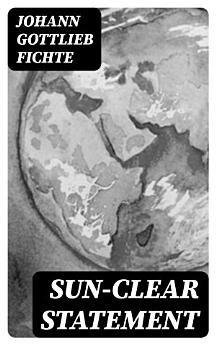Sun-Clear Statement
Johann Gottlieb Fichte
gush 2022 · DigiCat
Libër elektronik
81
Faqe
family_home
I përshtatshëm
info
reportVlerësimet dhe komentet nuk janë të verifikuara Mëso më shumë
Rreth këtij libri elektronik
In 'Sun-Clear Statement,' Johann Gottlieb Fichte presents an erudite examination of transcendental idealism, an edifice upon which much of German philosophical thought of the time rested. The work is characterized by Fichte's precise and assertive prose which maneuvers through complex conceptual landscapes with the aim of delineating the scope and position of the newest philosophy within its rightful boundaries. By engaging directly with the reader, Fichte strives to clarify the most abstruse elements of his argumentation, insisting that his text serves as an elucidation rather than an expansion of philosophical doctrine. The literary style is rigorous and demanding, embedded within the philosophical discourse of the Enlightenment and early Romantic periods, making pronounced strides in the understanding of subjective consciousness and its role in the formation of knowledge. Johann Gottlieb Fichte, a formidable figure in German philosophy, informs 'Sun-Clear Statement' with his deep engagement in the intellectual discourse of his time. His commitment to the clarification and defense of transcendental idealism mirrors his broader philosophical ambitions to develop a system that fully accounts for the interrelations between the self and reality. Fichte's own scholarly journey, marked by studied interactions with the works of his contemporaries and predecessors, imbues this treatise with a sense of intellectual urgency, aiming to elucidate the true import of philosophy as an argumentative practice rather than a mere collection of philosophical concepts. For scholars and enthusiasts of philosophical literature, 'Sun-Clear Statement' is not only an essential reading but an intellectual challenge poised to refine one's conception of philosophy. Fichte's book comes highly recommended to anyone invested in the history of philosophical thought, particularly those keen on understanding the evolution of idealism and its impact on subsequent metaphysical and epistemological developments. The text is a testament to Fichte's enduring legacy as a thinker who, through the sheer force of his argumentation, seeks to bring the reader into a clearer understanding of philosophy's terrain within the human intellect and experience.
Rreth autorit
Johann Gottlieb Fichte was a seminal figure in German philosophy, born on May 19, 1762, in Rammenau, Saxony. A forefront intellectual during the late 18th and early 19th centuries, Fichte attended the University of Jena where his acquaintance with the works of Kant profoundly shaped his own thinking. He is often regarded as a key figure in German Idealism, expanding on Kant's critical philosophy to form his unique transcendental perspective. Fichte's philosophy emphasizes the active, spontaneous nature of the subject, often presented through a rigorous, almost axiomatic method, culminating in an ethical system where freedom is central. His philosophy laid the groundwork for later developments in existential and phenomenological thought, influencing philosophers such as Schelling and Hegel. His work 'Sun-Clear Statement,' though less well-known compared to his 'Science of Knowledge' (Wissenschaftslehre), continues to demonstrate his intricate analysis of knowledge and subjectivity. Fichte's literary style is characterized by a dense, challenging exposition, and by the attempt to synthetize a thorough account of consciousness and experience. His legacy extends beyond philosophy, as his ideas also resonated within the movement for German nationalism. Fichte's bold proclamation of the self-reliant 'I' and call for a moral populace made him one of the most provocative political thinkers of his time. He passed away on January 27, 1814, in Berlin, leaving behind a rich, complex body of work that continues to inspire philosophical debate.
Vlerëso këtë libër elektronik
Na trego se çfarë mendon.
Informacione për leximin
Telefona inteligjentë dhe tabletë
Instalo aplikacionin "Librat e Google Play" për Android dhe iPad/iPhone. Ai sinkronizohet automatikisht me llogarinë tënde dhe të lejon të lexosh online dhe offline kudo që të ndodhesh.
Laptopë dhe kompjuterë
Mund të dëgjosh librat me audio të blerë në Google Play duke përdorur shfletuesin e uebit të kompjuterit.
Lexuesit elektronikë dhe pajisjet e tjera
Për të lexuar në pajisjet me bojë elektronike si p.sh. lexuesit e librave elektronikë Kobo, do të të duhet të shkarkosh një skedar dhe ta transferosh atë te pajisja jote. Ndiq udhëzimet e detajuara në Qendrën e ndihmës për të transferuar skedarët te lexuesit e mbështetur të librave elektronikë.







